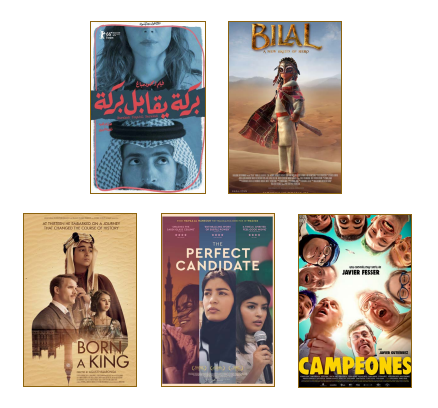
The movie begins. We find ourselves in the Arabian desert, late morning. Blinding light bounces off towers of rock. We glimpse the palm trees of a lush oasis.
We enter a Bedouin-style tent. It’s comfortable: grey blanketed wall, rugs, low sofas with a geometric pattern. In the shadows a man is speaking, his arm resting on the back of the sofa.
We pan through the tent and out the other side. But instead of the desert wilderness we expect, we see a swimming pool, sun loungers, a modern office complex and a highway leading to an international airport.
Well, that’s movie-making for you. Not everything is as it seems. Our leading man, for example, is no Bedouin tribesperson ‒ but Stephen Strachan, originally from Bayswater. Strachan has spent the past 12 years making films in the Middle East; the past three as film commissioner for AlUla.
His current mission: to bring film-makers to the area and create a thriving creative economy for visiting international talent and for Saudis seeking a career in the movies. But how exactly is he proposing to turn this little-known corner of Saudi Arabia into Tinseltown in the desert?
Drone-shot footage by Film AlUla shows the dramatic locations available to moviemakers

“We’re really trying to build an ecosystem here,” says Strachan, who heads up the Film AlUla project. To that end he and his team have just built a “film village”, with office space and 300 dedicated accommodation units for visiting crews.
Stephen Strachan
They offer free consultations to location scouts. Requests for permits are turned around in record time. Local crews can be hired in. There’s even a new, year-round training programme introducing local youth to all of the technical film disciplines.
“Hair and make-up, costumes, lighting, production... we want to upskill anyone who’s interested in film,” explains Strachan. “So when big movie comes over, they can pick up local talent.”
It’s all part of the Saudi government’s Vision 2030 plan, which is putting time, money and energy into selling the country to a wider audience. As part of that, it is investing $64 billion to try to become the Middle East’s main moviemaking hub.
There’s a reason film commissioners are big business – and we’re not just talking showbusiness. Films such as The Lord of the Rings epics and TV series like Game of Thrones have generated millions of dollars in box office and streaming receipts, but they have also attracted millions of “setjetting” visitors – and, billions in tourist revenue.
“The film industry is great for the local economy,” explains Strachan. “When a film comes into town, 67 per cent of the budget is spent on non-film-based local services. Plus when people see landscapes on film that resonate with them, they want to go there.”
No one knows that better than the Kingdom of Jordan. Some 700km north of AlUla is Wadi Rum, where David Lean’s Lawrence of Arabia still brings in adventurers ‒ 60 years after it was shot in 1962. It’s also still attracting directors and producers ‒ used over the years as a backdrop to sci-fi films ranging from Star Wars and Prometheus to The Martian and Dune.
Jordan’s Wadi Rum is still attracting visitors for its starring role in Lawrence of Arabia
Image courtesy Visit Jordan
Film AlUla’s target is two million tourists ‒ a lot, considering this project was launched from a standing start. It was only in 2019 that Saudi Arabia relaxed its visa restrictions, and only two years before that when Saudi cinemas opened ‒ after three decades of being closed.
During the time when shooting was impossible inside the Kingdom, other countries had to double as the Arabian peninsula on film. Tom Hanks’ A Hologram for the King (2016) was filmed in Morocco, 2007’s The Kingdom in Abu Dhabi; while Hidalgo ‒ the 2004 Viggo Mortensen vehicle about Saudi Arabian desert horse races in the 1800s ‒ was mostly shot in the Western US states, leading eagle-eyed viewers to complain about plants not native to the Middle East.
Now the tables have turned as AlUla is starting to be asked to stand in for other less welcoming or accessible regions. This year, for example, it had a starring role in Kandahar, the region’s first real big-budget action film starring the Scottish actor Gerard Butler in an Afghan rescue drama. Two other major movies are well on their way, too. Cherry, with Tom Holland, has AlUla doubling as Iraq. Desert Warrior, helmed by Rise of the Planet of the Apes director Rupert Wyatt, will be the Kingdom’s biggest production yet.
Stephen Strachan
The arthouse film-makers have been here too, with Cello, starring Jeremy Irons, based on a novel and script by Saudi author Turki Al Alshikh, who is also the chairman of the Kingdom's General Authority for Entertainment.
The appeal isn’t hard to understand. “You’re only half an hour from your bed in AlUla to pristine desert,” explains Strachan. “No sightseers, no telegraph wires.”
Film AlUla has an embarrassment of riches for film companies, including volcanoes, virgin desert and 2,000 year old tombs
Courtesy RCU

AlUla is more than just a sandy backdrop though. It’s one of the most significant archaeological sites in the world, with finds emerging all the time from the ancient sites at Hegra and Dadan.
Its old town is a major draw, too. Abandoned in the 1980s, it is easy to dress up – acting as a blank canvas for Middle Eastern or ancient villages.
“A large part of Kandahar was filmed in the old town,” says Strachan. “They transformed it. There were 300 extras, and the whole community got involved in the chase sequence.”
Pages from Film AlUla’s 84-page Production Guide, designed to help film-makers get the most out of shooting in the region https://filming.experiencealula.com/en/production-guide

The cast and crew were welcomed with open arms by locals, and in turn were able to enjoy the burgeoning tourism scene.
“We had 256 international crew from 38 countries,” says Strachan. “They all took advantage of what we have to offer: the winter arts festival, concerts at Maraya [AlUla’s spectacular mirror-fronted events space], pop-up restaurants. Gerry [Butler] hiked in the mountains and took helicopter rides”
No wonder production teams are taking the bait. In 2021, there were 71 productions in AlUla. This once-closed Kingdom is setting high standards for openness towards Hollywood, Bollywood TV and commercials.
Documentaries shot here have included The Architects of Ancient Arabia on Discovery Channel, which charted 7,000 years of history in the area
None of this would be happening without the social change within the country in a wider sense. “You've had a complete transformation of the way people work together,” says Strachan. “Film sets are mixed ‒ you have a mixture of men and women working at every level.”
The domestic film industry, far from being repressed, is now being supported and lauded. By 2030, the number of cinema screens is planned to quadruple, to 2,000, and the Saudi box office will be worth $1 billion.
The Kingdom is producing talented directors such as Mahmoud Sabbagh (director of the first Saudi film on Netflix), Meshal Jacir and stars including the British-Saudi actress Aiysha Hart.


“Some recent big hitters from the Saudi film scene include (L-R): ‘Barakah Meets Barakah’ and ‘Bilal: A New Breed of Hero’ were both among the first award-winning films from Saudi (at Berlin and Cannes respectively). Many films are co-produced with other nationalities ‒ like the Saudi-Spanish ‘Champions’ about Saudi Arabian footballers; Born a King (2018) which was produced with UK and Spanish teams, and ‘The Perfect Candidate’ (2018) with a joint Saudi and German crew.
But the outstanding star of the show for years to come will be the scenery, which offers cinematographers not one desert but several.
“We’ve got such a beautiful, creative, changeable landscape,” says Strachan as we wander around the perimeter of the protected royal commission lands and look towards the limestone bluffs and crags and the ancient lava fields.
“Look at these mountains, all those pink and purple hues. Ten minutes down the road, you’re in the pristine yellow Lawrence of Arabia sands. Another 10, you’re in an Afghan-style desert with grey rock, rubble and low hills. Twenty minutes in the other direction you’ve got an oasis of lush palm groves, a carpet of greenery… beautiful canyons and rockscapes.”
Stephen Strachan
With Strachan and his team on the case, all these topographical wonders could be on the way to a screen near you very soon.
“We’ve got more big international films coming. And with the amount of interest we’re already getting from the US and the UK, it’s a really powerful way of getting our landscapes and our destination over to a global audience.”
For more information on visiting AlUla or to book a trip, visit experiencealula.com